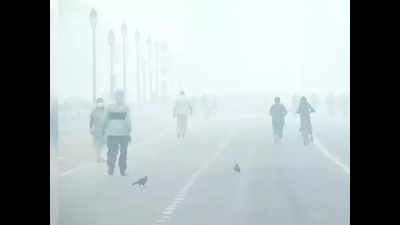- News
- City News
- delhi News
- Delhi records worst January AQI in 3 years
Trending
This story is from January 24, 2021
Delhi records worst January AQI in 3 years
This January, Delhi has already recorded six “severe” air days, three times more than last January and close to the 2019 count of seven, the data of Central Pollution Control Board shows. The city has also seen a higher spike in pollution readings this January than in the last two.

The worst air quality index in these three January has been 460, recorded on the 15th of this year (file photo)
NEW DELHI: This January, Delhi has already recorded six “severe” air days, three times more than last January and close to the 2019 count of seven, the data of Central Pollution Control Board shows. The city has also seen a higher spike in pollution readings this January than in the last two.
Track the pollution level in your city
Experts are saying that while a spell of rain at the start of the month brought down pollution, it was the only western disturbance recorded in January so far.In comparison, last January had six western disturbance spells, which had not only brought rain but also led to an increase in wind speed.

Kuldeep Srivastava, scientist at India Meteorological Department and head of Regional Weather Forecasting Centre, said a mix of temperature and low wind speed had played a key role this year. “There has been adequate moisture, which has led to a number of dense and very dense fog days. Only one western disturbance has been recorded this month. With each western disturbance, there is an increase in wind speed and rain also brings down pollutants,” said Srivastava.
The worst air quality index in these three January has been 460, recorded on the 15th of this year. In comparison, it was 437 on January 1, 2020, and 444 in 2019. Experts say more “severe” air days could be on the way by the end of the month, with the mercury set to fall once again after January 24.
Anumita Roy Chowdhury, executive director of research and advocacy at Centre for Science and Environment, said related data needed to be analysed over a longer duration. “A smog episode can take place any time, based on meteorological factors, and this can stay for a few days, impacting data for the month,” she said.
Severe cold conditions and factors such as low wind speed are impacting Delhi now, Roy Chowdhury pointed out. “The key is also to have strict enforcement on the ground.”
Track the pollution level in your city
Experts are saying that while a spell of rain at the start of the month brought down pollution, it was the only western disturbance recorded in January so far.In comparison, last January had six western disturbance spells, which had not only brought rain but also led to an increase in wind speed.

“Since January 14, the air quality in Delhi dipped to ‘severe’ and ‘very poor’ levels on account of the calm atmospheric conditions. In addition, prevailing cold weather conditions will demand more space heating, leading to additional loads of emissions in the atmosphere,” said L S Kurinji, research analyst at Council on Energy, Environment and Water that has analysed data for this January, comparing it with the same month in 2020 and 2019. “With lower mixing height, pollutants remain trapped closer to the surface and deteriorate the air quality.”
Kuldeep Srivastava, scientist at India Meteorological Department and head of Regional Weather Forecasting Centre, said a mix of temperature and low wind speed had played a key role this year. “There has been adequate moisture, which has led to a number of dense and very dense fog days. Only one western disturbance has been recorded this month. With each western disturbance, there is an increase in wind speed and rain also brings down pollutants,” said Srivastava.
The worst air quality index in these three January has been 460, recorded on the 15th of this year. In comparison, it was 437 on January 1, 2020, and 444 in 2019. Experts say more “severe” air days could be on the way by the end of the month, with the mercury set to fall once again after January 24.
Anumita Roy Chowdhury, executive director of research and advocacy at Centre for Science and Environment, said related data needed to be analysed over a longer duration. “A smog episode can take place any time, based on meteorological factors, and this can stay for a few days, impacting data for the month,” she said.
Severe cold conditions and factors such as low wind speed are impacting Delhi now, Roy Chowdhury pointed out. “The key is also to have strict enforcement on the ground.”
End of Article
FOLLOW US ON SOCIAL MEDIA










